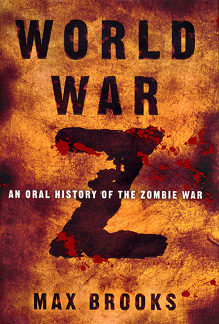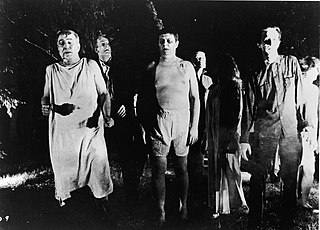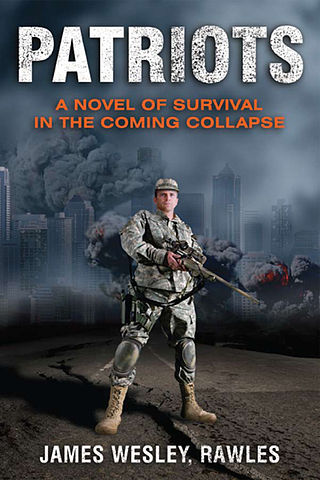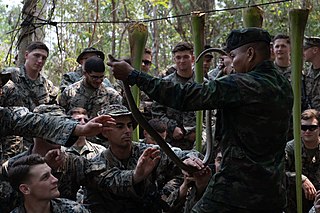
Apocalyptic and post-apocalyptic fiction is a subgenre of science fiction in which the Earth's civilization is collapsing or has collapsed. The apocalypse event may be climatic, such as runaway climate change; astronomical, such as an impact event; destructive, such as nuclear holocaust or resource depletion; medical, such as a pandemic, whether natural or human-caused; end time, such as the Last Judgment, Second Coming or Ragnarök; or any other scenario in which the outcome is apocalyptic, such as a zombie apocalypse, cybernetic revolt, technological singularity, dysgenics or alien invasion.

The Day of the Triffids is a 1951 post-apocalyptic novel by the English science fiction author John Wyndham. After most people in the world are blinded by an apparent meteor shower, an aggressive species of plant starts killing people. Although Wyndham had already published other novels using other pen name combinations drawn from his real name, this was the first novel published as "John Wyndham".
Survivalism is a social movement of individuals or groups who proactively prepare for emergencies, such as natural disasters, and other disasters causing disruption to social order caused by political or economic crises. Preparations may anticipate short-term scenarios or long-term, on scales ranging from personal adversity, to local disruption of services, to international or global catastrophe. There is no bright line dividing general emergency preparedness from prepping in the form of survivalism, but a qualitative distinction is often recognized whereby preppers/survivalists prepare especially extensively because they have higher estimations of the risk of catastrophes happening. Nonetheless, prepping can be as limited as preparing for a personal emergency, or it can be as extensive as a personal identity or collective identity with a devoted lifestyle.
Jerome Morrell Ahern was an American writer of science fiction and action novels, non-fiction books, and articles for various firearms publications. He was considered an expert on firearms and related accessories, produced his own line of holsters, and served as president of a firearms company.

Lucifer's Hammer is a science fiction post-apocalypse-survival novel by American writers Larry Niven and Jerry Pournelle that was first published in 1977. It was nominated for the Hugo Award for Best Novel in 1978. Two issues of a planned six-part comic book adaptation were published by Innovation Comics in 1993.
The concept of a mutant is a common trope in comic books and science fiction. The new phenotypes that appear in fictional mutations generally go far beyond what is typically seen in biological mutants and often result in the mutated life form exhibiting superhuman abilities or qualities.

Robinsonade is a literary genre of fiction wherein the protagonist is suddenly separated from civilization, usually by being shipwrecked or marooned on a secluded and uninhabited island, and must improvise the means of their survival from the limited resources at hand. The genre takes its name from the 1719 novel Robinson Crusoe by Daniel Defoe. The success of this novel spawned so many imitations that its name was used to define a genre, which is sometimes described simply as a "desert island story" or a "castaway narrative".

Subterranean fiction is a subgenre of adventure fiction, science fiction, or fantasy which focuses on fictional underground settings, sometimes at the center of the Earth or otherwise deep below the surface. The genre is based on, and has in turn influenced, the Hollow Earth theory. The earliest works in the genre were Enlightenment-era philosophical or allegorical works, in which the underground setting was often largely incidental. In the late 19th century, however, more pseudoscientific or proto-science-fictional motifs gained prevalence. Common themes have included a depiction of the underground world as more primitive than the surface, either culturally, technologically or biologically, or in some combination thereof. The former cases usually see the setting used as a venue for sword-and-sorcery fiction, while the latter often features cryptids or creatures extinct on the surface, such as dinosaurs or archaic humans. A less frequent theme has the underground world much more technologically advanced than the surface one, typically either as the refugium of a lost civilization, or as a secret base for space aliens.

Swan Song is a 1987 horror novel by American novelist Robert R. McCammon. Published June 1, 1987, it is a work of post-apocalyptic fiction describing the aftermath of a nuclear war that provokes an evolution in humankind. Swan Song won the 1987 Bram Stoker award, tying with Stephen King's Misery.

World War Z: An Oral History of the Zombie War is a 2006 zombie apocalyptic horror novel written by American author Max Brooks. The novel is broken into eight chapters: “Warnings”, “Blame”, “The Great Panic”, “Turning the Tide”, “Home Front USA”, “Around the World, and Above”, “Total War”, and “Good-Byes”, and features a collection of individual accounts told to and recorded by an agent of the United Nations Postwar Commission, following a devastating global conflict against a zombie plague. The personal accounts come from individuals from different walks of life and all over the world, including Antarctica and outer space. The "interviews" detail the experiences of the survivors of the crisis, as well as social, political, religious, economic, and environmental changes that have occurred as a result.

World War III, sometimes abbreviated to WWIII, is a common theme in popular culture. Since the 1940s, countless books, films, and television programmes have used the theme of nuclear weapons and a third global war. The presence of the Soviet Union as an international rival armed with nuclear weapons created persistent fears in the United States and vice versa of a nuclear World War III, and popular culture at the time reflected those fears. The theme was also a way of exploring a range of issues beyond nuclear war in the arts. U.S. historian Spencer R. Weart called nuclear weapons a "symbol for the worst of modernity."

Zombie apocalypse is a subgenre of apocalyptic and post-apocalyptic fiction in which society collapses due to overwhelming swarms of zombies. Typically only a few individuals or small bands of survivors are left living. In some versions, the reason the dead rise and attack humans is unknown, in others, a parasite or infection is the cause, framing events much like a plague. Some stories have every corpse rise, regardless of the cause of death, whereas others require exposure to the infection.

Dies the Fire is a 2004 alternate history and post-apocalyptic novel written by S. M. Stirling. It is the first installment of the Emberverse series and is a spin-off from S. M. Stirling's Nantucket series in which the Massachusetts island of Nantucket is thrown back in time from March 17, 1998, to the Bronze Age.
Endworld is a series of post-apocalyptic novels written by David L. Robbins. The first book was published in 1986. As of 2021, there have been 31 novels written in the main series, along with three prequels and a crossover novel with his "Wilderness" series. David Robbins also wrote a 13 novel spin-off to this series called Blade.

The Patriots novel series is a five-novel series by survivalist novelist and former U.S. Army officer and blogger, James Wesley Rawles. It is followed by his Counter-Caliphate Chronicles novel series.
Night of the Living Dead is a zombie horror media franchise created by George A. Romero beginning with the 1968 film Night of the Living Dead, directed by Romero and cowritten with John A. Russo. The franchise predominantly centers on different groups of people attempting to survive during the outbreak and evolution of a zombie apocalypse. The latest installment of the series, Survival of the Dead, was released in 2009, with a sequel, Twilight of the Dead, in development. This would be the first film in the series not directed by George Romero, who died on July 16, 2017.

Survival or survivorship, the act of surviving, is the propensity of something to continue existing, particularly when this is done despite conditions that might kill or destroy it. The concept can be applied to humans and other living things, to physical object, and to abstract things such as beliefs or ideas. Living things generally have a self-preservation instinct to survive, while objects intended for use in harsh conditions are designed for survivability.











